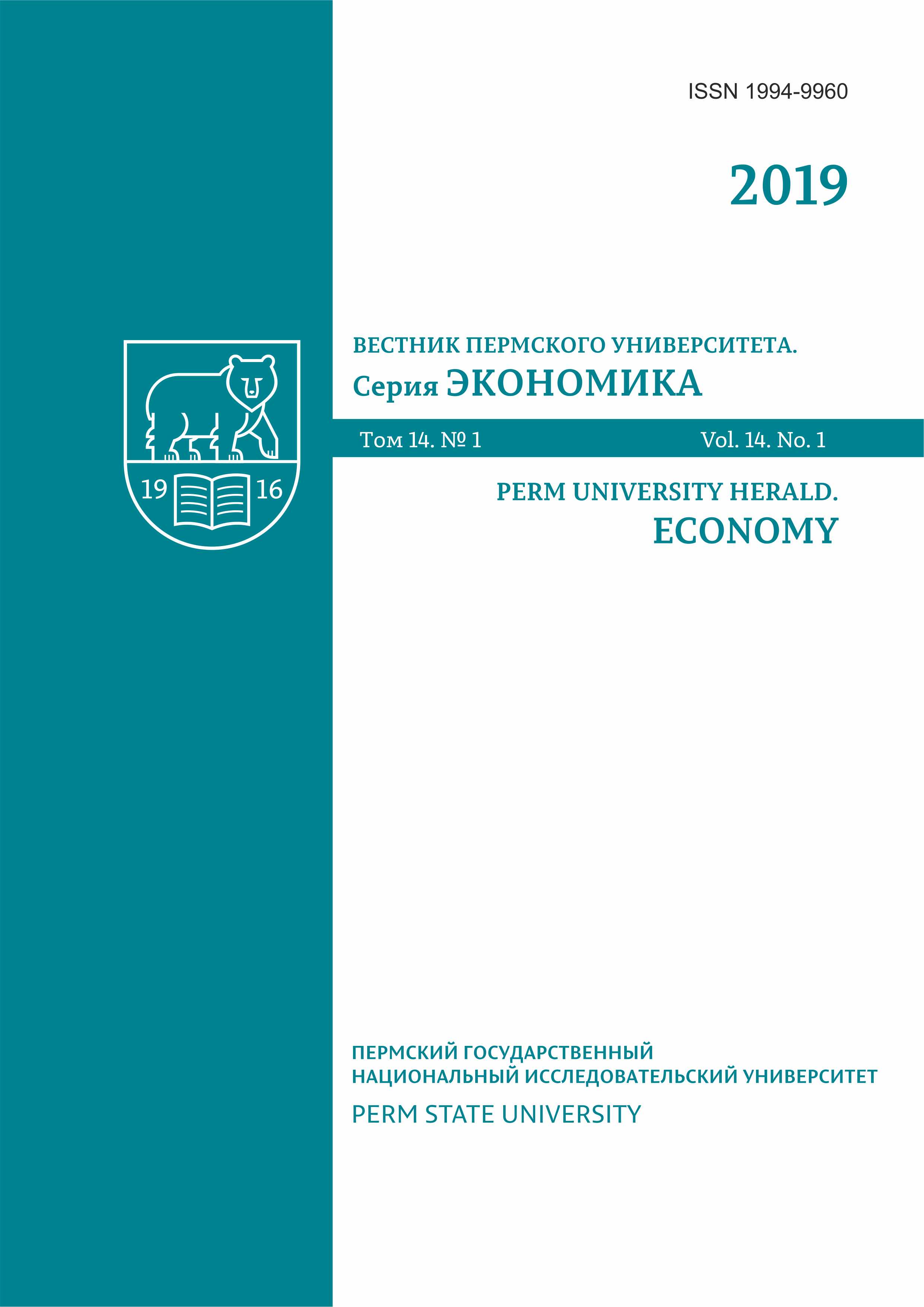Ключевые факторы формирования условий развития инновационно-промышленного кластера
DOI:
https://doi.org/10.17072/1994-9960-2019-1-177-192Аннотация
Актуальность кластерной концепции управления территориями возрастает в связи с усилением геоконкуренции и потребностью в совершенствовании бизнес-моделей инновационного роста при ускорении темпов научно-технического прогресса. Цель исследования состоит в идентификации ключевых факторов успешной кластеризации экономики региона и моделировании влияния инновационно-промышленного кластера на социально-экономическое развитие территории. Гипотеза работы заключается в рассмотрении кластеризации региональной экономики как механизма роста благосостояния и конкурентоспособности региона в условиях глобализации социально-экономических процессов. Методология исследования базируется на концепции кластерного развития территорий М. Портера. В результате изучения мирового опыта и основных концепций кластерного развития сделан вывод о прогрессирующем росте интереса к кластеризации в разных по уровню социально-экономического развития странах и регионах, а также выявлены ключевые факторы, формирующие условия функционирования кластерных образований и способствующие успешной реализации кластерной стратегии. Определены основные черты кластеризации экономики в развитых и развивающихся странах и установлены их различия, обусловленные, главным образом, инновационной ориентированностью кластерных образований в развитых странах и преобладанием промышленных кластеров над инновационными в развивающихся странах. Разработана концептуальная модель влияния инновационно-промышленного кластера на социально-экономическое развитие территории, основанная на взаимодействии факторов микро- и макросреды. Методом глубокого интервьюирования для понимания мотивационных факторов кластеризации экономики Ивановской области оценена заинтересованность стейкхолдеров (бизнеса, научно-образовательного сектора, инвесторов, партнеров, региональной и федеральной власти) в применении кластерной стратегии развития территории. Проанализирован проект текстильно-промышленного кластера Ивановской области, проведен SWOT-анализ и предложены четыре стратегии его развития – эндогенный рост, «умная специализация», цифровая трансформация промышленности, технологическое и инновационное развитие отрасли на основе динамического наверстывания. Результаты проведенного исследования имеют значение для совершенствования концепции управления социально-экономическим развитием региона на основе инновационно-промышленной кластеризации территорий.
Ключевые словаинновационно-промышленный кластер, промышленная политика, текстильно-промышленный кластер, факторы успеха кластеризации, интересы участников кластера, кластерная стратегия, SWOT-анализ кластера, эффективность кластерной политики, региональное развитие, конкурентоспособность экономики региона
Для цитированияИбрагимова Р.С., Головкин Д.С. Ключевые факторы формирования условий развития инновационно-промышленного кластера // Вестник Пермского университета. Сер. «Экономика». 2019. Том 14. № 1. С. 177–192. DOI 10.17072/1994-9960-2019-1-177-192
БлагодарностиИсследование выполнено при финансовой поддержке РФФИ, проект № 18-410-370004 «Прогнозирование и оценка стратегических направлений социально-экономического и инновационного развития текстильной промышленности на основе форсайт-исследований».
Список литературы1. Best M.H. The new competition: Institutions of industrial restructuring. Cambridge, Mass: Harvard University Press, 1990. 296 p.
2. Porter M.E. Competitive strategy: Techniques for analyzing industries and competitors. N.Y.: The Free Press, 1998. 397 p.
3. Porter M.E. Competitive advantage: Creating and sustaining superior performance. N.Y.: The Free Press, 1998. 558 p.
4. Porter M.E. The competitive advantage of nations. N.Y.: The Free Press, 1998. 856 p.
5. Porter M.E. On competition. Boston: Harvard Business School Press, 1998. 485 p.
6. Enright M.J. The globalization of competition and the localization of competitive advantage: Policies toward regional clustering. In book: The globalization of multinational enterprise activity and economic development / N. Hood, S. Young (eds). Macmillan Publishers Limited, 2000. P. 303–331.
7. Порваткина М.В. Зарубежный опыт формирования и развития региональных кластеров в экономически развитых странах // Вестник ТГПУ. 2011. № 12 (114). С. 112–116.
8. Карпов С.А. Управление инновационным развитием региона на примере технопарка Франции // Вопросы государственного и муниципального управления. 2012. № 3. С. 88–93.
9. Брицко Г.В. Особенности организации инновационных систем на примере Великобритании и Италии // Инновации и инвестиции. 2013. № 7. С. 152–156.
10. Кузнецова А.М. Региональная политика Турции: концепция «полюсов роста» в действии? // Мировое и национальное хозяйство. 2009. № 3-4 (10-11). С. 38–48.
11. Яшин С.Н., Трифонов Ю.В., Кошелев Е.В. Формирование механизма управления инновационным развитием промышленного региона: монография. Нижний Новгород: ООО «Печатная Мастерская РАДОНЕЖ», 2017. 276 с.
12. Weber A.A. Theory of the location of industries. Chicago: University of Chicago Press, 1929. 256 p.
13. Ибрагимова Р.С. Концепция развития предприятия в условиях интернационализации экономических процессов // Вестник Московского университета. Серия 6: Экономика. 2005. № 4. С. 86–106.
14. Lenchuk E.B., Vlaskin G.A. The Cluster approach in the innovation development strategy of foreign countries // Science and Technology. Studies on Russian Economic Development. 2010. Vol. 21, Iss. 5. P. 484–492.
15. Иванов Ю.Б., Анненкова Е.В., Пономаренко Е.В. Развитие кластерных структур в региональном экономическом пространстве // Экономика региона. 2009. № 2 (18). С. 63–72.
16. Слонимский А.В., Слонимская М.Н. Кластеры: итальянский опыт и белорусские возможности // Наука и инновации. 2013. Т. 12, № 130. С. 24–28.
17. Грасмик К.И., Колесова А.А. Технологический кластер в Бангалоре: ключевые факторы развития // Вестник Омского университета. 2014. № 2 (72). С. 152–155.
18. Romer P.M. Increasing returns and long-run growth // Journal of Political Economy. 1986. Vol. 94, October. № 5. P. 1002–1037.
19. Foray D., David P., Hall B. Smart specialization – the concept // Knowledge Economists Policy Brief. 2009. June. № 9. URL: http://ec.europa.eu/invest-in-research/pdf/download_en/kfg_policy_ brief_no9.pdf?11111 (дата обращения: 26.06.2018).
20. Ибрагимова Р.С., Токунов А.А. Оценка эффективности текстильных кластеров: методический аспект // Современные наукоемкие технологии. Региональное приложение. 2016. № 3 (47). С. 75–84.
21. Токунов А.А. Оценка эффективности промышленного кластера для стейкхолдеров // Инновационное развитие регионов в условиях глобализации: материалы междунар. науч.-практ. конф. (3–5 сент. 2015 г.): в 2 ч. Иваново: ИвГУ, 2015. Ч. 1. С. 140–145.
22. Табунов И.В. Модель развития интеллектуального капитала инновационно-промышленного кластера // Проблемы современной экономики. 2015. Вып. 2 (54). С. 222–224.
23. Дементьев В.Е. Инвестиционные проблемы инновационной паузы в экономике // Проблемы прогнозирования. 2011. № 4. С. 13–27.
24. Радаев В.В., Данилина В.Н., Котельникова З.В., Назарбаева Е.А. Текущее состояние и перспективы развития легкой промышленности в России. М.: Изд. дом Высшей школы экономики, 2014. 333 с.
25. Шутилов Ф.В. Методы оценки эффективности и синергетический эффект кластеров // Научный вестник Южного института менеджмента. 2013. № 2. С. 81–85.
26. Патрушева Е.Г., Большакова Е.А. Оценка экономической эффективности регионального инновационного кластера // Управление экономическими системами: электронный научный журнал. 2015. № 4 (76). URL: http://uecs.ru/regionalnaya-ekonomika/item/3443-2015-04-15-13-20-03 (дата обращения: 26.06.2018).
Загрузки
Опубликован
Выпуск
Раздел
Лицензия

Это произведение доступно по лицензии Creative Commons «Attribution» («Атрибуция») 4.0 Всемирная.










